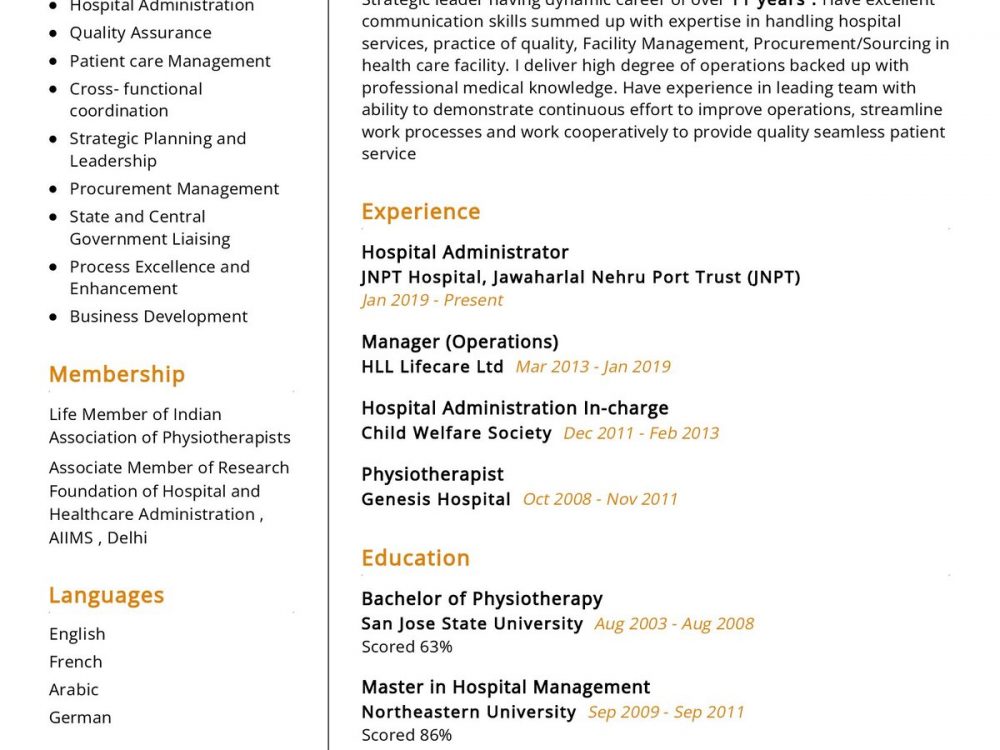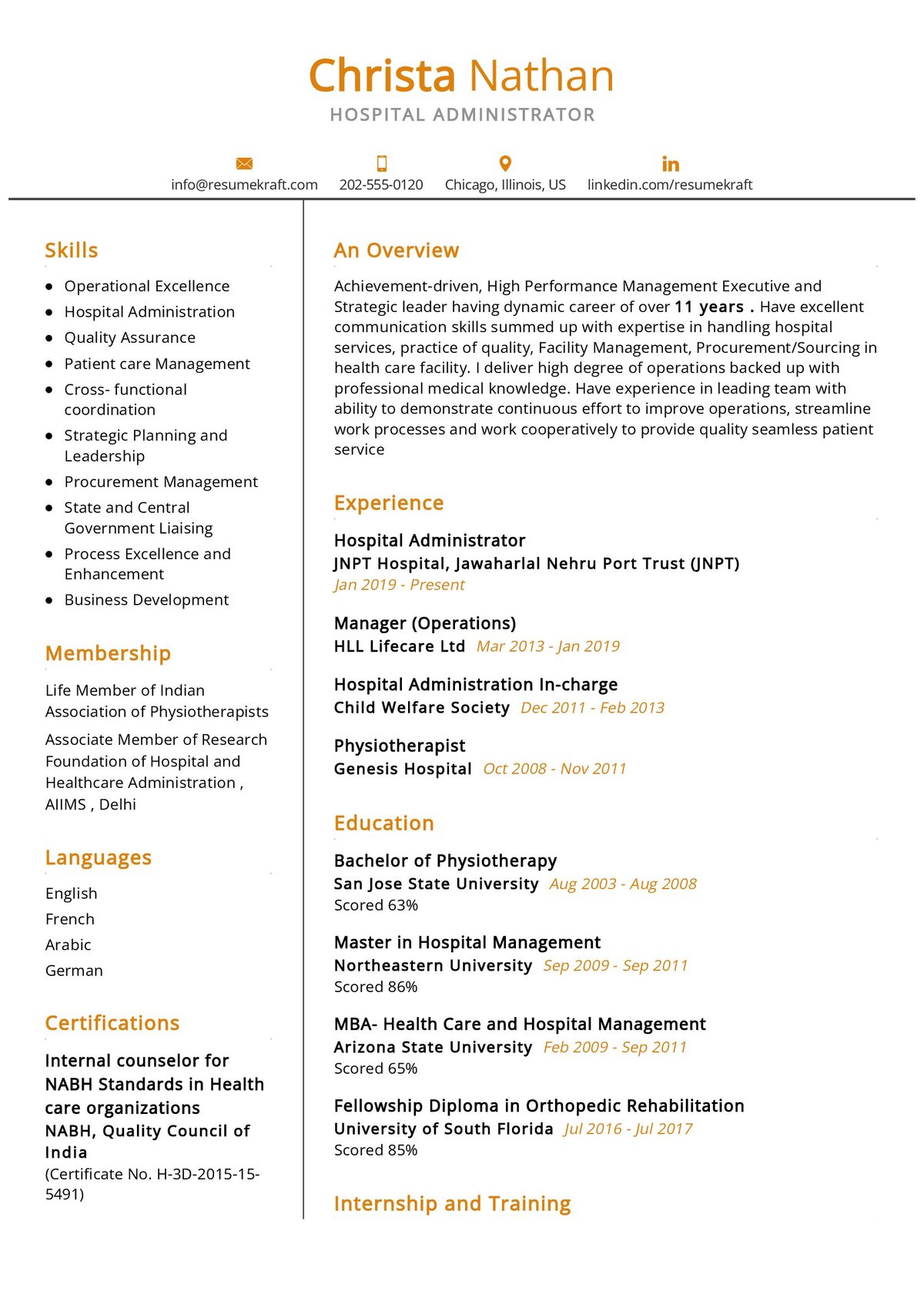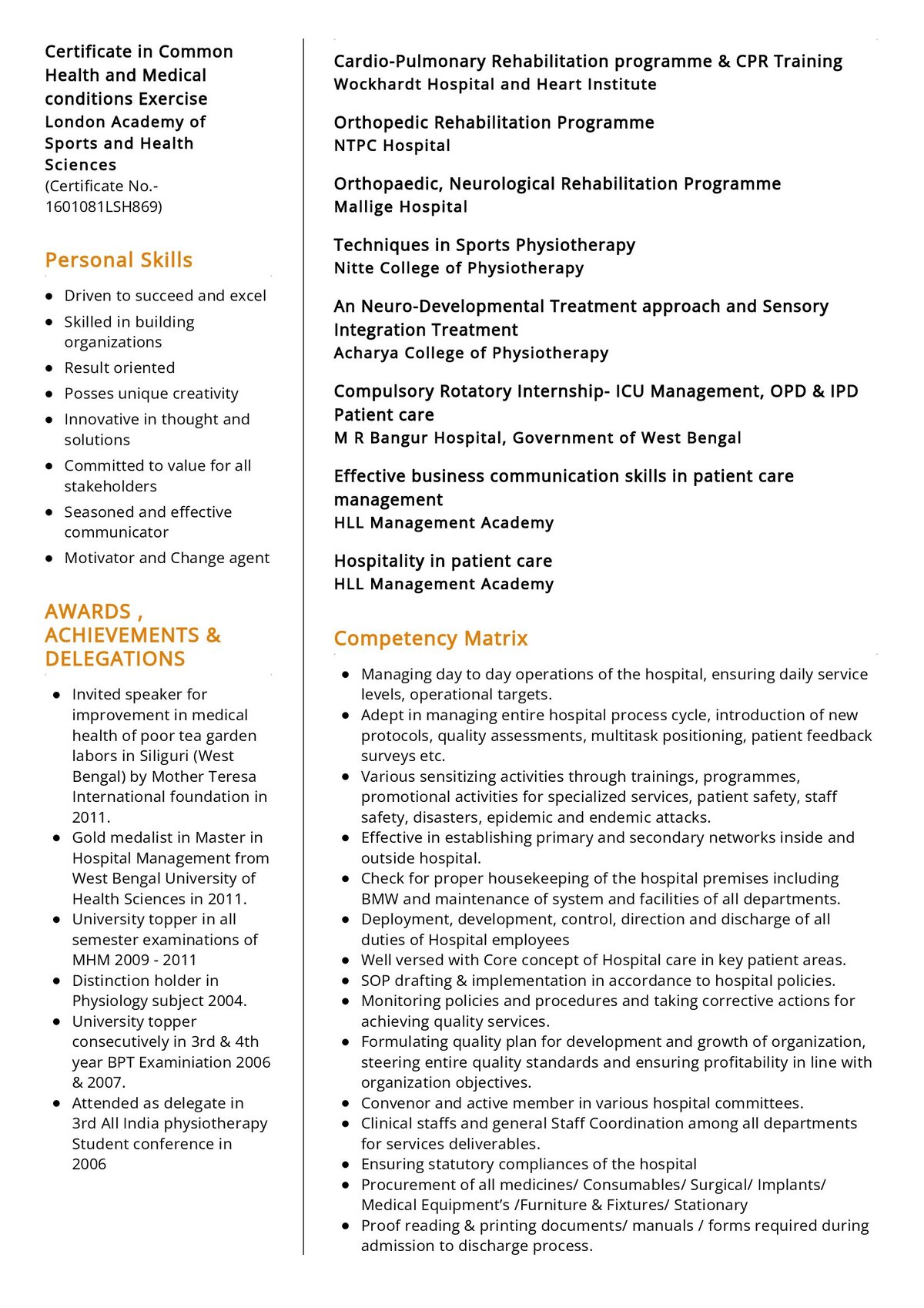What Should Be Included In A Hospital Administrator Resume?
When writing a hospital administrator resume, it’s important to make sure it accurately portrays your qualifications and skills. As a hospital administrator, you will be responsible for managing the day to day operations of a medical facility. To stand out from other applicants, you need to highlight the most relevant aspects of your experience and qualifications on your resume.
When crafting your resume, you should begin with a professional summary that outlines your relevant experience and qualifications. This should be followed by a list of professional accomplishments, such as awards or promotions. Make sure to list the most relevant job duties and accomplishments in order of importance.
In addition, it’s important to include a section on your educational background. List any degrees or certifications that are applicable to the job you are applying for. This will showcase your commitment to the industry and your desire for continuous learning.
It’s also important to include a list of professional skills related to the position. This can include things like communication, problem solving, and organizational skills. Be sure to highlight any areas of expertise and any specialties you possess.
Finally, be sure to end your resume with a list of references. This will demonstrate your professionalism and show employers that you have people who will vouch for your work. Choose references that are relevant to the job you are applying for and include their contact information.
By following these guidelines, you can create a compelling resume that accurately portrays your qualifications and skills. With a great resume in hand, you can show employers why you are the perfect candidate for the job.
What Skills Should I Put On My Resume For Hospital Administrator?
When writing a resume for a hospital administrator position, it is important to showcase the skills that you have that make you the ideal candidate for the job. As a hospital administrator, you need to be an effective leader who is organized and able to effectively manage people, resources, and operations. You should also demonstrate your ability to be a strategic thinker, delivering effective and efficient services that help the hospital reach its goals.
When crafting a resume for a hospital administrator position, here are some key skills to include:
- Leadership: As a hospital administrator, you are responsible for leading a team of people. You should have the ability to delegate tasks, set goals, and monitor progress.
- Communication: You need to be able to effectively communicate with other departments and personnel in the hospital. You should also have excellent written and verbal communication skills, as well as the ability to actively listen to concerns of others.
- Analytical Skills: You will need to be able to analyze data, develop strategies, and make decisions that will benefit the hospital. You should be able to take in information and make informed decisions that will help the hospital reach its goals.
- Financial Management: As a hospital administrator, you will need to be able to manage the finances of the hospital. You should have knowledge of budgeting, auditing, and financial reporting.
By showing the skills that you possess that are necessary for a hospital administrator position, you can set yourself apart from other candidates. Make sure to highlight these skills on your resume and provide examples of how you have effectively utilized them in past positions.
What Is The Job Description Of The Hospital Administrator?
The job of a hospital administrator is to manage the day-to-day operations of a hospital, including staffing, budgeting, and providing quality healthcare services. They work with healthcare professionals to make sure that patients receive the best care possible and that the hospital runs smoothly. They must also ensure that the organization is in compliance with federal and state laws and regulations. Hospital administrators must possess strong leadership and management skills, as well as a thorough understanding of health care delivery systems. They must be able to motivate and inspire staff to meet the hospital’s goals.
Hospital administrators are also responsible for budgeting and financial planning. This includes identifying sources of revenue, ensuring that funds are used in a cost-effective manner, and setting up systems to track budget performance. They must also stay up to date on changes in health care legislation that can affect the hospital’s operations.
Hospital administrators must be good communicators and have excellent problem-solving skills. They must be able to negotiate with insurance companies and other vendors, as well as communicate effectively with the medical staff. Additionally, they must be able to coordinate a variety of services, ranging from medical care to marketing and community outreach. They must also be well-versed in human resources issues, including recruitment, retention, and employee relations.
Hospital administrators are often responsible for the overall strategic planning of the hospital and must be able to identify and manage risk. They must be aware of market trends and be able to develop strategies to help the hospital remain competitive. In addition, they must be able to plan for and manage disasters, such as natural disasters or pandemics.
Overall, the job of a hospital administrator is very complex and requires a wide range of skills. They must be able to effectively manage resources, maintain relationships with staff, physicians, and other healthcare professionals, as well as stay current with the latest medical policies and procedures. They must also be able to manage budgets, negotiate contracts with vendors and insurance companies, and coordinate services across multiple departments. Hospital administrators must also be familiar with the legal and regulatory requirements for the healthcare industry, such as the Health Insurance Portability and Accountability Act (HIPAA).
What Is A Good Objective For A Hospital Administrator Resume?
When crafting a resume for a hospital administrator role, having a good objective is essential. A well-crafted objective should provide the hiring manager with a clear understanding of your goals, qualifications, and experience. Your objective should be tailored to the specific job you’re applying for, and should reflect the skills, qualifications, and experience the employer is looking for.
When writing a good hospital administrator resume objective, you should focus on demonstrating your knowledge and expertise in the field. Include any relevant experience in healthcare management, such as previous positions in clinical or administrative settings. You should also list your qualifications, such as certifications and specializations.
Your objective should also demonstrate your leadership skills. Explain how you’ve successfully managed teams, delivered cost-effective solutions, and implemented new initiatives. By clearly outlining your accomplishments, you’ll give yourself an edge over other candidates.
In addition to highlighting your skills and experience, you should also mention why you’re the perfect fit for the role. Mention how you can bring value to the hospital and why you’re passionate about healthcare. This will show the hiring manager that you’re invested in the position and highly motivated.
By following these tips, you can create a powerful objective that will help you stand out from other applicants. With a well-crafted objective, you can make a great impression on the hiring manager and increase your chances of landing a hospital administrator role.
What Are The Career Prospects In The Hospital Administrator?
A career as a hospital administrator is a great choice for individuals who are interested in managing healthcare services and ensuring the welfare of patients. Hospital administrators are responsible for overseeing the administrative, financial, and operational aspects of a healthcare facility. They work to ensure a safe and efficient environment for patients and staff, manage budgets, and provide quality healthcare services. In addition, hospital administrators must stay abreast of changes in healthcare regulations and be able to implement them in their hospitals.
Hospital administrators must have a minimum of a bachelor’s degree in healthcare administration, business administration, or a related field. They must also have a master’s degree in healthcare administration or business administration to qualify for more senior level positions. Additionally, they must have excellent communication, organizational, and managerial skills.
The job prospects for hospital administrators are strong and are expected to grow along with the growth of the healthcare industry. According to the Bureau of Labor Statistics, the demand for healthcare administrators is expected to increase by 17% from 2018 to 2028, faster than the average for all occupations. This growth is due to increased demand for healthcare services as the population continues to age, as well as the need for better healthcare management and operations.
Hospital administrators typically work full-time and often work long hours, including evenings and weekends. Salaries for hospital administrators vary depending on the location and size of the facility, as well as the level of experience and education. The median annual wage for healthcare administrators was $100,980 in May 2019.
For those interested in pursuing a career as a hospital administrator, having the necessary qualifications and experience is essential. Having a well-written and organized resume is also important in order to stand out from other applicants . A master’s degree in healthcare administration or a related field is often required, and some employers may also prefer candidates who have experience in the healthcare industry. Additionally, strong organizational and communication skills are essential in order to successfully manage healthcare operations and teams.
Key Takeaways for an Hospital Administrator resume
When writing a resume for a Hospital Administrator role, there are a few key takeaways to remember. First, it’s important to demonstrate your understanding of the healthcare environment and the different types of healthcare services. Your resume should include any past experience you have working in a hospital or other healthcare setting so employers know you possess the necessary skills and qualifications for the job. Additionally, employers will want to see that you have strong organizational and communication skills as well as experience managing people, budgets, and resources.
Be sure to include any relevant education and certifications you have in the healthcare field. This could include a Bachelor’s or Master’s degree in health or business administration, or any other relevant field. It’s also important to list any qualifications or certifications you have obtained related to healthcare management.
Finally, it’s important to emphasize your experience in data analysis, problem solving, and decision making. You should also list any experience you have with healthcare software or medical records software. By highlighting your skills and qualifications, you can show employers that you are a good fit for the Hospital Administrator role.
Furthermore, they must ensure compliance with these regulations. Additionally, hospital administrators must be able to develop and implement marketing and public relations strategies to promote the hospital’s services and to attract potential new patients. They must also be knowledgeable in budgeting and financial management, as well as managing personnel and payroll. Hospital administrators must also have excellent interpersonal and communication skills, as they are responsible for coordinating staff, patients, and visitors, and ensuring the hospital runs efficiently. They must also be able to evaluate and analyze data to make informed decisions.



